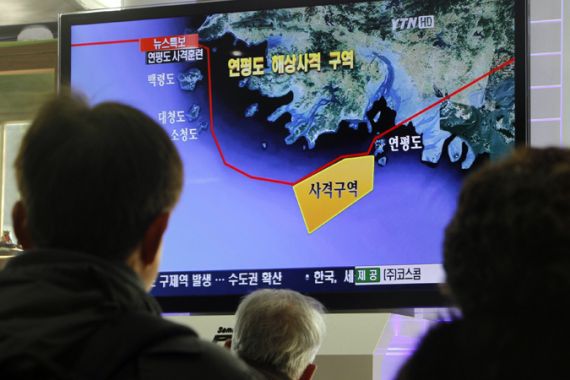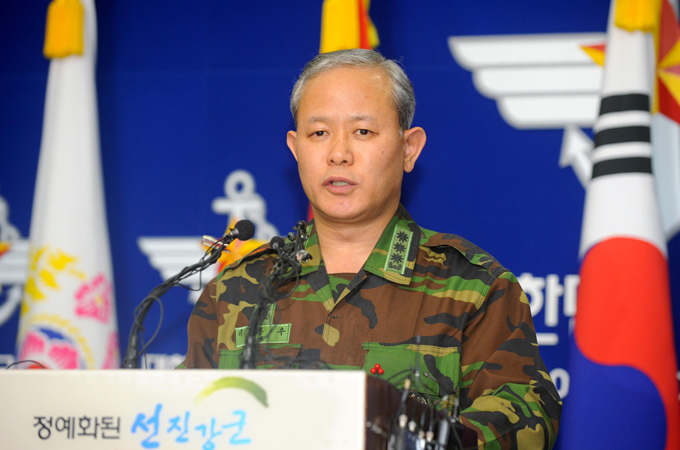Q&A: Tensions on Korean Peninsula
Al Jazeera speaks with a North Korea expert who expresses guarded optimism about de-escalation of the current dispute.

 |
| World leaders have failed to agree on how to defuse the latest crisis on the Korea Peninsula [Reuters] |
Northeast Asia remains tense after an exchange of fire last month that left two South Korean citizens dead, in addition to two marines.
The shelling of Yeonpyeong Island was the North’s first attack on civilian areas in the South since the 1950-1953 Korean War, which ended with an armistice but not a peace treaty.
North Korea on Monday called the South’s most recent live-fire drills “reckless” but backed down from a threat to retaliate, signalling a possible easing of tensions.
Yet an emergency meeting at the UN on Sunday failed to reach a solution to the tensions.
Russia, which initiated the UN session, has said it is becoming increasingly concerned about the direction that the conflict could take.
But Bill Richardson, a frequent unofficial US envoy, has announced two unexpected new nuclear concessions from the North.
China is promoting a return to six-party nuclear disarmament talks, which the US and S Korea seem unlikely to pursue for now.
Experts like Leon Sigal, director of the Northeast Asia Cooperative Security Project at the Social Science Research Council, find fault with the South Koreans for having taken on a more muscular posture.
“South Korea has backed away from an October 2007 summit agreement that provided for discussions of a joint fishing area and naval confidence-building measures in the contested waters of the West Sea,” Sigal told Al Jazeera.
Other analysts are more inclined to say that the North has provoked the South. But there is still a lack of clear knowledge about the North’s intentions.
For more on the volatile situation in the Koreas, Al Jazeera spoke with Charles Armstrong, director of the Centre for Korean Studies at Columbia University:
Is North Korea genuinely afraid of being attacked?
North Korea has always lived in fear of being attacked, although it’s not clear that this fear has actually heightened in recent months.
For many years, South Korea and the US have performed military exercises which the Democratic People’s Republic of Korea (DPRK) regularly denounces as “provocative”, but last month’s shelling of Yeonpyeong Island was the first time North Korea has responded with an artillery attack on a civilian area.
Recent events suggest that the leadership is trying to show its toughness to South Korea and the world.
How should South Korea and the US proceed?
The US and South Korea have responded with military exercises. Whether that has any effect on North Korea remains to be seen.
South Korean president Lee Myung-bak is under considerable domestic pressure to take tough action, and some in South Korea (more in the civilian arena than the military) are calling for a direct response, such as an airstrike on a North Korean military facility.
That is unlikely to happen due to the risk of escalation.
How long might current tensions persist?
The current high level of tension is likely to go down in the next few months, unless the conflict escalates.
Already there are signs – notably Governor Bill Richardson’s discussion with North Korea’s leaders in the last few days – that the parties involved will return to negotiations via the six-party talks.
That will not happen immediately but is the only realistic way out of the current crisis.
To what extent is N Korean succession likely to impact the country’s stability?
There is much speculation about the succession leading to instability, but so far there has been no evidence that this is the case.
As with Kim Jong-il’s own succession in the 1970s and 1980s, the North Koreans are preparing his son’s succession very carefully and deliberately.
What is the likelihood that the DPRK will have a new government in 5 years?
The North Korean regime is much more resilient than many assume.
It survived the death of its founding leader Kim Il-sung in 1994, the famine of the late 1990s, and nuclear confrontations with the US from the 1990s until today.
No one can say for sure, but I would not predict the DPRK government disappearing any time soon. Whether we like it or not, we will have to deal with North Korea as it is for the foreseeable future.
Is China willing to accept a Korea united by the South and allied with the US?
I think the WikiLeaks report suggests that the Chinese are realistic about such a contingency, but that is not their preferred option.
They would rather see North Korea reform, with continued Chinese influence there, but they want to avoid having a US-aligned unified Korea on their border.
Did botched currency reforms make the economic situation significantly worse?
Apparently the leadership was surprised and deeply concerned with the failure of the currency reform, which has made them much more cautious about reform in general.
Is the country liberalising in any meaningful way, politically or economically?
There is not much in the way of top-down liberalisation, and some of the economic reform instituted in the early 2000s has been scaled back in the last five years.
But farmers’ and other markets are much more prevalent than they were ten years ago, and recent visitors have noted a considerable presence of mobile phones, foreign cars and other goods.
There is in effect a bottom-up liberalisation in the economy that has been going on for quite some time, but nothing in the way of political reform. Nor are we likely to see such reform any time soon.